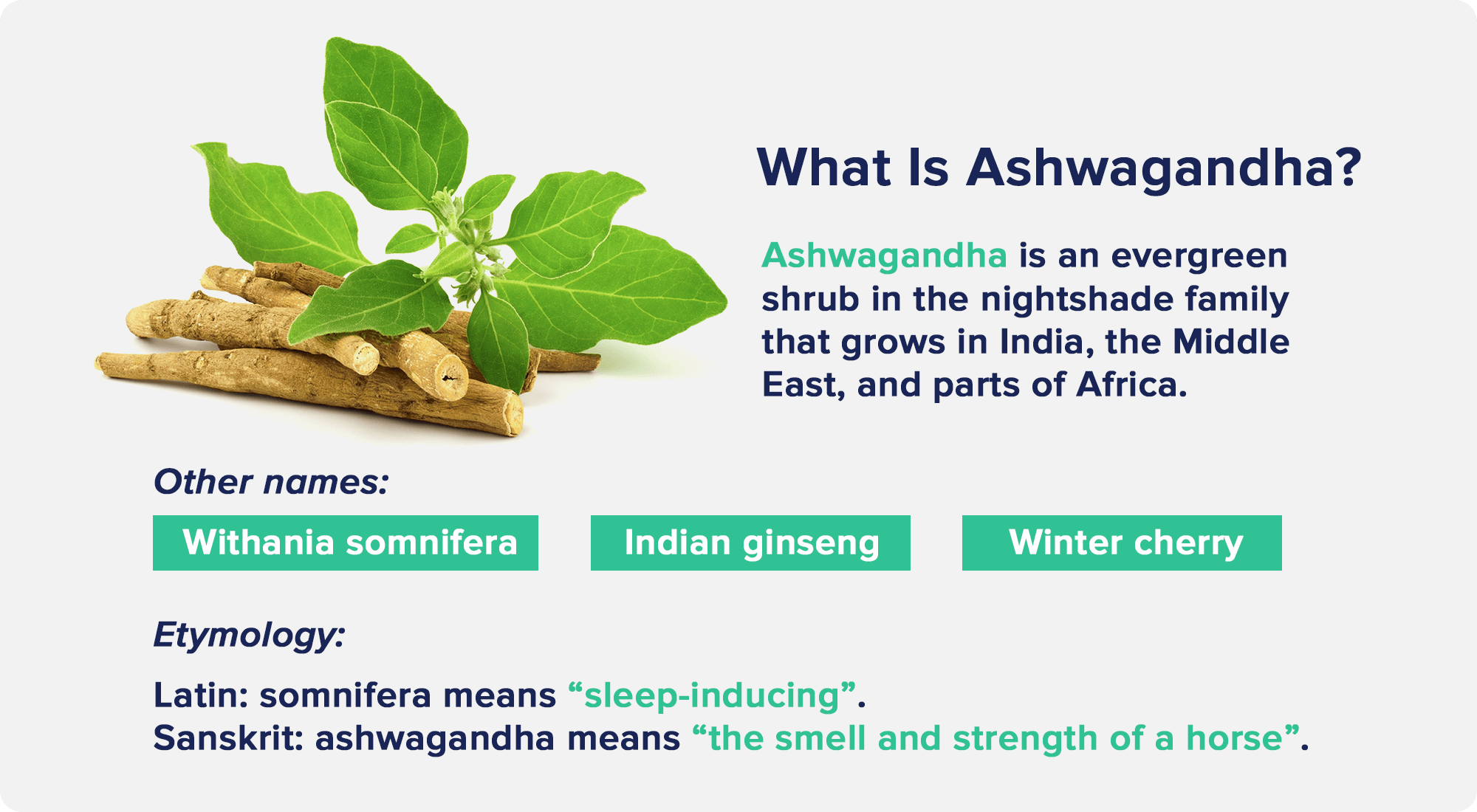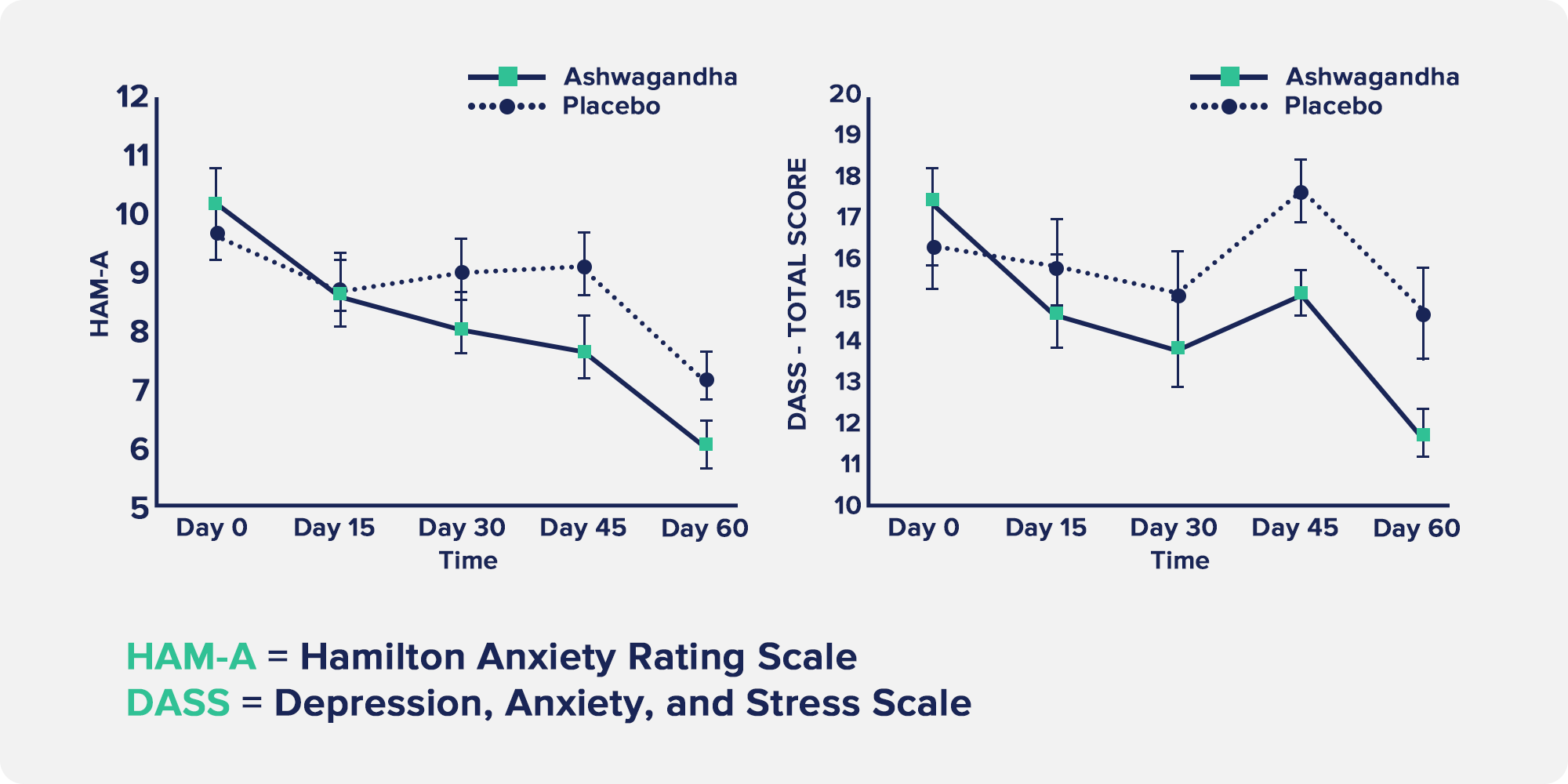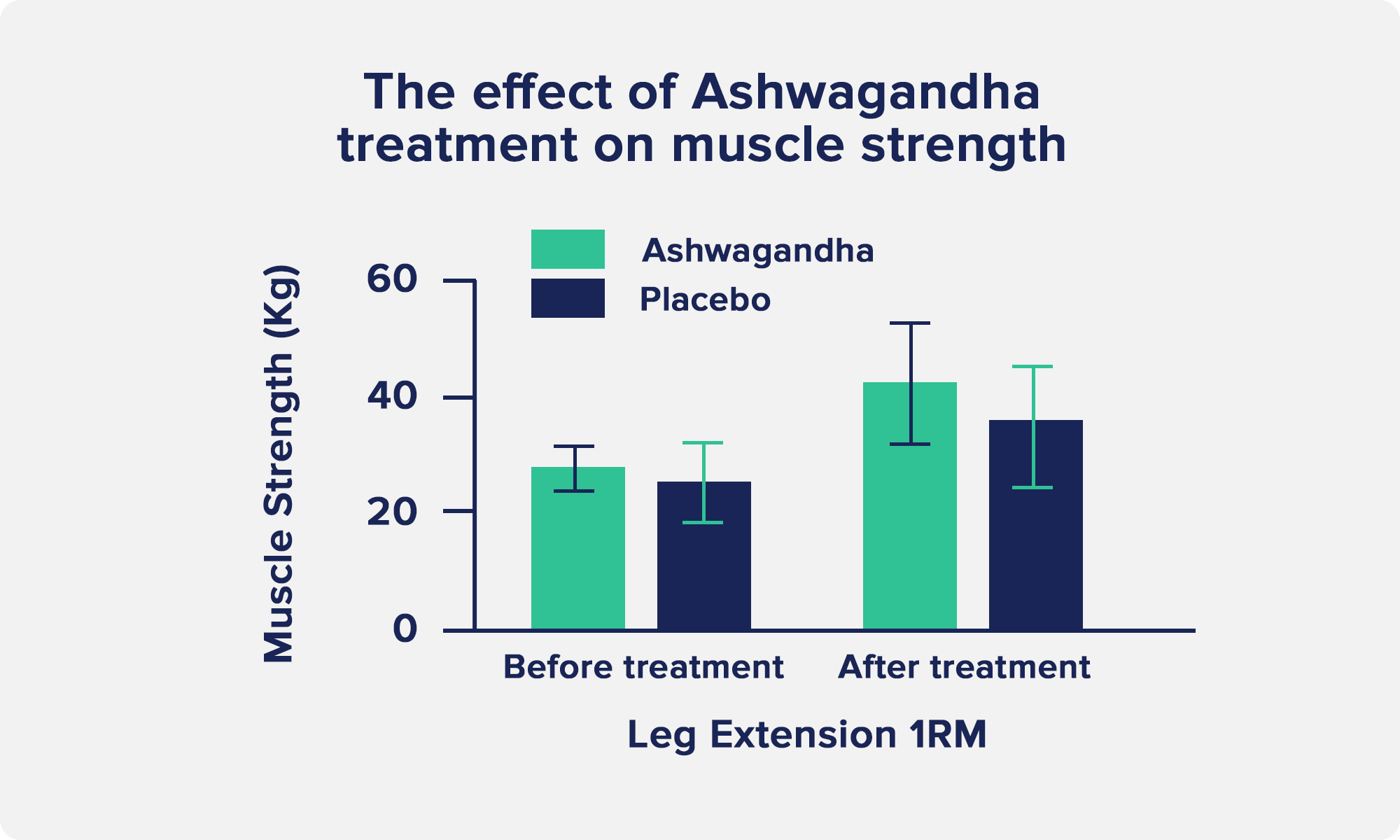Try our favorite, clean protein powder: See our top pick →
Try our favorite, clean protein powder: See our top pick →
This post contains links through which we may earn a small commission should you make a purchase from a brand. This in no way affects our ability to objectively critique the products and brands we review.
Evidence Based Research To fulfill our commitment to bringing our audience accurate and insightful content, our expert writers and medical reviewers rely on carefully curated research.
Read Our Editorial Policy
Also known as winter cherry or Indian ginseng, ashwagandha is considered a Rasayana herb—an ancient Ayurvedic term that roughly translates to rejuvenation, youth, and longevity.
The benefits of using ashwagandha are wide-reaching—historically, it has been used for over 6,000 years for everything from stress relief to sexual vitality to strengthening muscles.
In recent years, people have also looked to ashwagandha for weight loss—but can it really work?
In this article, learn more about the top six ways that ashwagandha may benefit weight loss, from restoring sleep and reducing blood sugar to acting as an antioxidant and amping up muscle mass.

Ashwagandha (Withania somnifera) is a flowering plant in the nightshade family that is native to India but also grows in the Middle East and Africa.
The Sanskrit word ashwagandha roughly translates to “the smell and strength of a horse”—and anyone who has gotten a potent whiff of ashwagandha capsules or powders can attest to that.
In addition to providing strength and stamina, ashwagandha paradoxically also calms and relaxes—in fact, the “somnifera” in its species name is Latin for “sleep-inducing.”
This ability to provide energy and support sleep simultaneously is a key characteristic of its adaptogenic properties.
As an adaptogen—plants, herbs, or roots that help the body resist stressors and maintain overall balance—ashwagandha can help the central nervous system adapt to your body’s specific needs at that time, whether under or overstressed.
Some research has shown that supplementing with ashwagandha is linked to weight loss.
But how exactly does this work?
Let’s take a look at the six ways that ashwagandha may help you lose weight or maintain a healthy body weight.
Due to its adaptogenic properties, one of ashwagandha’s most well-known qualities is its ability to modulate the stress response.
Chronic stress—characterized by high cortisol—is known to cause or contribute to several health conditions, including being overweight or obese.
In addition to causing uncomfortable feelings of stress or anxiety, high cortisol levels have also been shown to trigger the redistribution of fat tissue into the abdominal region and increase appetite for high-energy foods rich in carbohydrates or fat.
Ashwagandha has been shown to lower cortisol levels, which may lead to weight loss by reducing body fat and cravings.
In a 2019 study published in Medicine, stressed but otherwise healthy adults who took 240mg of ashwagandha for 60 days had more significant reductions in blood cortisol and self-reported anxiety levels than those who took a placebo.

Plus, research from 2017 looked at the effects of supplemental ashwagandha on chronic stress and body weight.
The researchers found that 600mg of daily ashwagandha supplementation significantly reduced perceived stress, serum cortisol, food cravings, and body weight while increasing happiness levels after eight weeks compared to a placebo.
The ashwagandha-supplemented group experienced an average weight loss of 5.1 pounds over the 8-week study, while the placebo group was about half that, at 2.5 pounds on average.
Ashwagandha may help to support a healthier body composition by increasing muscle mass.
A redistribution of body weight—favoring muscle over fat—can increase energy expenditure and help with fat loss over time.
Two studies from 2015 and 2018 have looked at the effects of ashwagandha on muscle mass.

The researchers found that young adult males who supplemented with 500-600mg of ashwagandha for 8 to 12 weeks during a strength training program had significantly greater increases in upper and lower body muscle mass and strength, with reduced muscle damage post-exercise.
Plus, the men in the 2015 study lost 2% more body fat than the placebo group.
More muscle mass supports your metabolism by increasing energy expenditure, meaning that the more muscle you have, the more calories your body burns at rest.
Oxidative stress occurs from an accumulation of harmful compounds called free radicals or reactive oxygen species, which damage cells and DNA.
Not only is oxidative stress linked to accelerated aging and chronic disease development, but it also is thought to contribute to obesity by altering food intake and triggering the deposition of white adipose tissue (an unhealthy type of fat).
Ashwagandha acts as an antioxidant, helping to fight oxidative stress and free radical buildup.
In animal studies, ashwagandha has been found to restore beneficial antioxidants like glutathione and superoxide dismutase, which could indirectly benefit body weight.
Sleep is essential for health—including maintaining a healthy weight.
A meta-analysis combining data from 18 studies and over 600,000 adults found that people who regularly get less than five hours of sleep are 55% more likely to be obese—and that each additional hour of sleep that one regularly gets can reduce BMI by 0.35 points (kg/m2).
So it’s safe to say that getting enough sleep is beneficial for weight loss—and ashwagandha may be able to help support your snoozin’.
In one 10-week study, adults who took 600mg of ashwagandha per day had significant reductions in sleep latency (the time it takes to fall asleep) with increases in sleep quality and efficiency—the percentage of time spent asleep while in bed.
The ashwagandha-supplemented adults also increased their total sleep time by 50 minutes per night, compared to 29 minutes in the placebo group.
Lower blood glucose levels lead to your body producing less insulin, which can contribute to weight loss and decreased fat mass.
Insulin is an essential hormone for managing blood sugar, but its chronically high levels can increase fat storage and weight gain.
When insulin levels are consistently elevated, the body’s ability to burn fat for energy is impaired—therefore, managing blood sugar levels can reduce insulin production to support a healthy body weight.
In a meta-analysis of 24 studies, ashwagandha significantly reduced blood glucose, insulin, and hemoglobin A1C levels—a three-month average of blood sugar levels.
In another older study, adults with type 2 diabetes who supplemented with ashwagandha had significant reductions in blood glucose levels after 30 days—in fact, the decline was similar to that of a prescription blood- sugar-lowering drug.
Lastly, ashwagandha may help with weight loss in men by supporting healthy testosterone levels.
Low testosterone in men contributes to weight gain and obesity—and vice versa, as obesity is also a major contributor to declining testosterone.
In a study of overweight men aged 40 to 70, supplementing with 600mg of ashwagandha for 16 weeks increased testosterone levels by 13.7%.

Unfortunately, this study didn’t look at body weight changes in the participants, but it’s possible that ashwagandha may have supported weight loss due to the testosterone boost.
Ashwagandha has generally been recognized as a safe supplement, with few reports of adverse effects.
However, excessive doses of ashwagandha might cause digestive problems like upset stomach, diarrhea, or vomiting.
Most studies involve taking ashwagandha in doses ranging from 250-800mg daily for 30 days to 16 weeks.
According to the research, the most benefits are seen in doses of 400-600mg per day, which can be split into two doses of 200-300mg each.
Due to its sleep-inducing qualities, it’s possible to experience mild drowsiness when taking it—but if taken at night, that could be the desired effect.
Pregnant or breastfeeding women will want to consult their doctor before taking ashwagandha.
People with a nightshade allergy should avoid ashwagandha, and people taking thyroid, diabetes, or blood pressure medications should ask their doctor, as it may interact with these drugs.
Ashwagandha can be taken in capsule, powder, or liquid extract form.
Ashwagandha may help you lose belly fat, as it reduces stress and cortisol, fights oxidative stress, improves sleep quality and blood glucose metabolism, and increases muscle mass and testosterone in males.
There are few studies on weight loss and ashwagandha.
Some available research suggests that supplementing with ashwagandha for eight weeks leads to an average weight loss of 5.1 pounds.
The best time to take ashwagandha depends on your goals.
For example, if you want to improve your sleep quality, try taking it before bed.
If you are aiming for calm energy, stress reduction, or blood sugar control for the day, try taking the supplement in the morning.
Ashwagandha can be taken with or without meals.
However, ashwagandha works best when taken over time—taking it just a few times will not be enough to induce beneficial health outcomes.
Andallu B, Radhika B. Hypoglycemic, diuretic and hypocholesterolemic effect of winter cherry (Withania somnifera, Dunal) root. Indian J Exp Biol. 2000;38(6):607-609.
Beccuti G, Pannain S. Sleep and obesity. Curr Opin Clin Nutr Metab Care. 2011;14(4):402-412. doi:10.1097/MCO.0b013e3283479109
Cappuccio FP, Taggart FM, Kandala NB, et al. Meta-analysis of short sleep duration and obesity in children and adults. Sleep. 2008;31(5):619-626. doi:10.1093/sleep/31.5.619
Choudhary D, Bhattacharyya S, Joshi K. Body Weight Management in Adults Under Chronic Stress Through Treatment With Ashwagandha Root Extract: A Double-Blind, Randomized, Placebo-Controlled Trial. J Evid Based Complementary Altern Med. 2017;22(1):96-106. doi:10.1177/2156587216641830
Durg S, Bavage S, Shivaram SB. Withania somnifera (Indian ginseng) in diabetes mellitus: A systematic review and meta-analysis of scientific evidence from experimental research to clinical application. Phytother Res. 2020;34(5):1041-1059. doi:10.1002/ptr.6589
Hosny Mansour H, Farouk Hafez H. Protective effect of Withania somnifera against radiation-induced hepatotoxicity in rats. Ecotoxicol Environ Saf. 2012;80:14-19. doi:10.1016/j.ecoenv.2012.02.003
Kumar P, Singh R, Nazmi A, Lakhanpal D, Kataria H, Kaur G. Glioprotective effects of Ashwagandha leaf extract against lead induced toxicity. Biomed Res Int. 2014;2014:182029. doi:10.1155/2014/182029
Langade D, Kanchi S, Salve J, Debnath K, Ambegaokar D. Efficacy and Safety of Ashwagandha (Withania somnifera) Root Extract in Insomnia and Anxiety: A Double-blind, Randomized, Placebo-controlled Study. Cureus. 2019;11(9):e5797. Published 2019 Sep 28. doi:10.7759/cureus.5797
Lopresti AL, Drummond PD, Smith SJ. A Randomized, Double-Blind, Placebo-Controlled, Crossover Study Examining the Hormonal and Vitality Effects of Ashwagandha (Withania somnifera) in Aging, Overweight Males. Am J Mens Health. 2019;13(2):1557988319835985. doi:10.1177/1557988319835985
Lopresti AL, Smith SJ, Malvi H, Kodgule R. An investigation into the stress-relieving and pharmacological actions of an ashwagandha (Withania somnifera) extract: A randomized, double-blind, placebo-controlled study. Medicine (Baltimore). 2019;98(37):e17186. doi:10.1097/MD.0000000000017186
Manna P, Jain SK. Obesity, Oxidative Stress, Adipose Tissue Dysfunction, and the Associated Health Risks: Causes and Therapeutic Strategies. Metab Syndr Relat Disord. 2015;13(10):423-444. doi:10.1089/met.2015.0095
van der Valk ES, Savas M, van Rossum EFC. Stress and Obesity: Are There More Susceptible Individuals?. Curr Obes Rep. 2018;7(2):193-203. doi:10.1007/s13679-018-0306-y
Wankhede S, Langade D, Joshi K, Sinha SR, Bhattacharyya S. Examining the effect of Withania somnifera supplementation on muscle strength and recovery: a randomized controlled trial. J Int Soc Sports Nutr. 2015;12:43. Published 2015 Nov 25. doi:10.1186/s12970-015-0104-9
Ziegenfuss TN, Kedia AW, Sandrock JE, Raub BJ, Kerksick CM, Lopez HL. Effects of an Aqueous Extract of Withania somnifera on Strength Training Adaptations and Recovery: The STAR Trial. Nutrients. 2018;10(11):1807. Published 2018 Nov 20. doi:10.3390/nu10111807
Subscribe now and never miss anything about the topics important to you and your health.